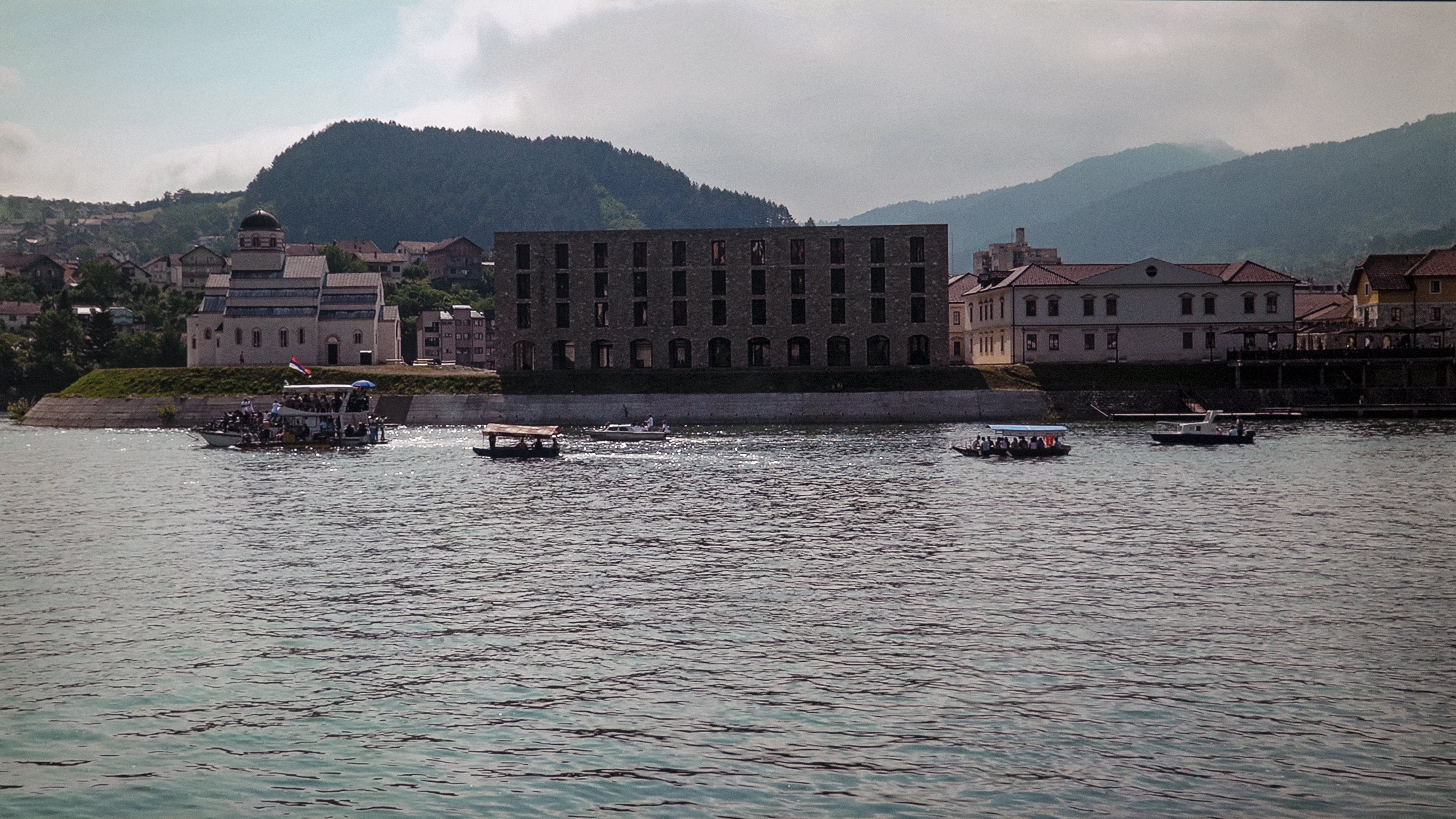The Stone Speakers, the first feature length documentary from Bosnian-Canadian filmmaker Igor Drljaca, takes a low key, but emotionally powerful look at his native country’s current troubles through the lens of its booming and unlikely tourism industry. Since the end of the violent Yugoslavian Civil War in 1995 and the fall of both Communist and Socialist governments, Bosnia has remained directionless and in a state of overall free fall; economically, socially, racially, and religiously splintered with few agreeable solutions for the future and the country’s 44% unemployment rate, the worst in Eastern Europe. Bosnia might not have much more going for it than tourism, but The Stone Speakers finds Drljaca questioning whether or not that industry can be sustained without losing the lessons of the past.
The Stone Speakers is a perfect extension of the work Drljaca did on his autobiographical short film The Fuse and his most recent fictional feature The Waiting Room, both of which looked critically and personally about the division between Bosnia’s past and present. To show the boost and damage that has been done to Bosnia through tourism, The Stone Speakers settles on an examination of four specific locations throughout the country. Each has a specific tourist identity, but all have similarly uneasy attachments to the country’s past and future.
Medjugorje has been a spot for religious pilgrims – predominantly Catholic ones – since the early 1980s, when a group of boys attest that they saw The Virgin Mary appear on a hillside. Medjugorje hasn’t been officially recognized as the site of a miracle by The Vatican, but that hasn’t stopped almost one million tourists from visiting every year. Visoko is a mecca for spiritual tourists of a different sort who flock to see the Pyramids of the Sun and the Moon and the labyrinth of tunnels beneath them, which reportedly (meaning: “no one has ever proven this”) predate the ancient Egyptian wonders. Visegrad has lots of riverbanks that are perfect for having a picnic, and it was a major hub for the Ottoman Empire for almost 500 years. Today, there are plenty of sites to see in Višegrad, almost all of which neglect to mention its ancient histories or even more recent ones, when the city’s rivers near the Serbian border were a major part of the Civil War. Tuzla is a town that was basically built on a salt mine, and regardless of the strife and unemployment that came hand in hand with the war effort, the entire community was basically sinking, anyway. Today, Tuzla isn’t exactly a tourist hotbed, but they do have some rather nice salt water lakes. But unlike the other municipalities and landmarks profiled by Drljaca in The Stone Speakers, Tuzla’s residents are banding together under an anti-fascist banner to ensure that the ghosts of the past never return to haunt them.

There are some casually observed asides involving other landmarks that aren’t covered in as great of detail, and plenty of local residents narrative Drljaca’s footage to provide some much needed cultural and historical context that one wouldn’t find at most of these sites, but for the most part The Stone Speakers is about placing the viewer in the shoes of those ghosts that haunt many of these spaces. Through the art of careful, frequently unbroken observations, Drljaca wants viewers to ask hard questions about the forms of tourism they’re seeing. It’s not necessarily meant to question the cultural or religious validity of the images these communities have created for themselves (which is almost too easy to do) or to say that these tour guides aren’t supposed to earn a living, but instead to make the viewer ponder all the things that aren’t being said or are being ignored and repressed in favour of conveying a sunnier image to these visitors.
The Stone Speakers is a nontraditional sort of travelogue. Most of the people who watch Drljaca’s latest likely won’t be familiar with the places and spaces being profiled, and yet the filmmaker is able to immerse viewers so fully into the day-to-day life of the Bosnian tourism industry that they can almost feel like a local. Are these spaces helping to soothe the painful history of the past or are they merely a means to an end? Do the people operating and maintaining these places believe what they’re selling, or is it a genuine way to keep the struggling economy afloat by any means necessary? It’s suggested through some of Drljaca’s interviews and observations that there are plenty of true believers to be found, but also a healthy number of skeptics. It feels like a natural reaction to find within a country where unscheduled religious and spiritual gatherings were forbidden for decades.
With few tangible industries remaining in the country, is there harm in making things up for the sake of a brighter future? Or do such enterprises and “white lies” start building a groundwork for a return to old habits or possibly something even worse? Like most looks at populaces struggling through poverty and an uncertain future, The Stone Speakers doesn’t have many definitive answers to offer, but plenty of stories – both real and imagined – that are worth sharing. It’s a work that establishes Drljaca as one of Canada and Bosnia’s most empathetic and culturally specific thinkers, and the feelings that it tries to coax from the audience in small increments are indispensable. It’s an overwhelmingly thoughtful and complicated documentary in an unassuming package.
The Stone Speakers opens at TIFF Bell Lightbox in Toronto on Friday, July 26, 2019.
Check out the trailer for The Stone Speakers:
Join our list
Subscribe to our mailing list and get weekly updates on our latest contests, interviews, and reviews.

